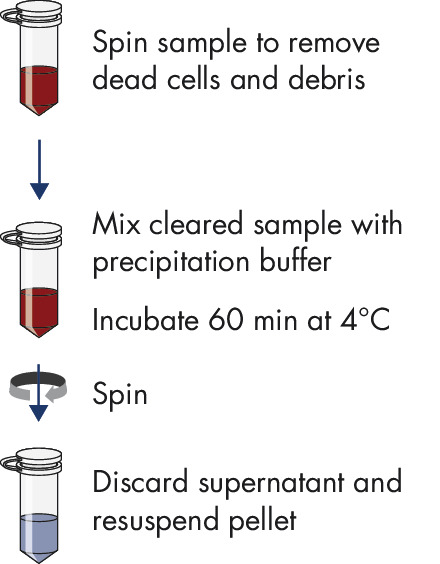For enrichment of exosomes and other extracellular vesicles from serum/plasma or cell/urine/CSF samples
Features
Excellent recovery of exosomes and other extracellular vesicles
Easy and straightforward protocol that takes less than 2 hours
No ultracentrifugation or phenol/chloroform steps required
Fully compatible with the miRCURY LNA miRNA PCR System
Suited for a variety of applications, such as miRNA or RNA profiling
Product Details
miRCURY Exosome Kits enable high-quality and scalable exosome isolation with an easy protocol that does not require special laboratory equipment. The miRCURY Exosome Serum/Plasma Kit is optimized for serum and plasma samples, while the miRCURY Exosome Cell/Urine/CSF Kit is designed for processing cell-conditioned media, urine and CSF samples. Both kits provide high exosomal recovery and seamless integration with different downstream assays.
Performance
Efficient exosome isolation from serum and plasma
The miRCURY Exosome Serum/Plasma Kit is optimized for isolation of exosomes from serum and plasma samples. This kit includes thrombin for efficient isolation of exosomes from plasma. To evaluate the efficiency of exosome isolation, we quantified the fraction of exosomes found in the pellet versus the supernatant, which is normally discarded (see figure Exosome recovery from serum). We observed a very high enrichment rate of extracellular vesicles.
Efficient exosome isolation from cell-conditioned media, urine and CSF
The miRCURY Exosome Cell/Urine/CSF Kit is optimized for isolation of exosomes from cell-conditioned media, urine and CSF samples. In studies comparing the fraction of exosomes in the pellet versus supernatant for these sample types, we observed a very high exosome enrichment rate (see figures Exosome recovery from cell-conditioned media and Exosome recovery from urine).
Typically, the amount of miRNA present in urine and CSF samples is very limited in healthy individuals. Therefore, we highly recommend performing an exosome isolation of these biofluids prior to RNA isolation and PCR profiling. This allows you to use the exosome isolation kit as a way of concentrating the sample, while keeping the amount of potential PCR inhibitors to a minimum (see figure Detect more miRNAs in biofluids using exosome isolation kits).
Principle
The miRCURY Exosome Kits utilize precipitation to enrich for exosomes and other extracellular vesicles. They are optimized to provide efficient isolation of exosomes from various biofluid samples, such as cell-conditioned media, urine, CSF, serum or plasma. The protocols are easy to use and take just two hours.
Although they are not species specific, the kit protocols are optimized for working with human biofluids. Refer to the miRCURY Exosome Kits Handbook for recommended starting material for different sample types.
Why study exosomes?
Exosomes are cell-derived, membranous particles ranging in size from 20–120 nm, approximately the same size as viruses but considerably smaller than microvesicles (see figure The structure of an exosome). Exosomes are excreted from cells into the surrounding media and can be found in many, if not all, body fluids. Their proposed role as intercellular hormone-like messengers, together with their stability as carrier of proteins and RNA, make them ideal as biomarkers for a variety of diseases and biological processes (see figure The hypothesis of exosomal shuttling of miRNAs).
Exosomes are secreted by most cell types and are formed by the fusion of multivesicular bodies with the plasma membrane. They are believed to be involved in a number of functions, including:
Immune regulation (e.g., tumor-derived exosomes may help tumors evade the immune response)
Blood coagulation
Cell migration
Cell differentiation
Cell-to-cell communication
Microvesicles that are larger than exosomes (up to 1 µm) are typically formed by blebbing of the plasma membrane, whereas exosomes are released via exocytosis from multivesicular bodies of the endosome.
Procedure
Samples are centrifuged to remove cells and debris, as well as cryoprecipitates for previously frozen samples. Precipitation buffer is added, and the samples are incubated for 1 hout at room temperature. Exosomes are pelleted during a 30 minute centrifugation step. After resuspension, the exosomes are ready for downstream analysis.
Applications
The miRCURY Exosome Kits are mainly developed for miRNA/RNA profiling applications.